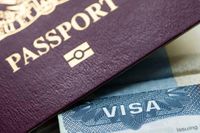Last week, an Argentinian delegation’s much-anticipated trip to the United States ended not with a diplomatic breakthrough, but with a red-faced retreat. What was supposed to be a moment of celebration for both countries—a signing ceremony for a new visa waiver agreement—turned into an international embarrassment, exposing cracks in communication at the highest levels of the U.S. administration and leaving Argentina’s officials stranded and empty-handed.
The saga began in July 2025, when U.S. Homeland Security Secretary Kristi Noem visited Buenos Aires. Her visit, full of optimism and photo ops, culminated in the signing of a statement of intent with Argentina’s security minister, Patricia Bullrich, to allow citizens from both countries to travel visa-free for up to 90 days. According to Axios, the agreement would also see Argentina’s customs agency ditch Chinese-made computer systems in favor of U.S. technology—a move that signaled both deepening ties and a subtle geopolitical shift away from Beijing.
Noem’s enthusiasm was matched by her host, President Javier Milei, a self-proclaimed admirer of President Donald Trump. The two nations, under their respective leaders, appeared to be forging a stronger friendship. "Under President Javier Milei's leadership, Argentina is becoming an even stronger friend to the United States—more committed than ever to border security for both of our nations," Noem declared in July, as reported by The Independent.
But beneath the surface, trouble was brewing. Noem had signed the statement of intent without first clearing it with Secretary of State and National Security Adviser Marco Rubio—a breach of protocol that would soon come back to haunt her. According to Axios, Rubio and White House Chief of Staff Susie Wiles quickly issued a memo reminding officials that any major international decision must be vetted by the National Security Council before proceeding. The State Department, it turned out, had reservations about Argentina’s eligibility for the Visa Waiver Program, primarily due to an ongoing corruption scandal involving Milei’s sister and close associates—a scandal Milei has repeatedly denied.
Despite these unaddressed concerns, Argentina pressed ahead. Last week, a high-level delegation, led by Juan Pazo, head of Argentina’s tax and customs agency, boarded a plane from Buenos Aires to Miami, with plans to continue on to Washington, D.C. for the signing ceremony. But as the delegation landed in Miami, the rug was pulled out from under them. The Department of Homeland Security (DHS) told the group not to proceed to the capital because the agreement was “missing a signature,” according to reports from Axios and Raw Story.
The Argentinian officials, stunned and left in limbo, spent two days in Miami before returning home without the coveted agreement. The diplomatic snub, as it has come to be known, was the result of what two sources familiar with the matter described as a lack of communication and organization by Secretary Noem. “Let’s just say this was not a great look from us,” a senior Trump administration official confessed to Axios. “It’s embarrassing.”
The fallout was immediate. The incident was preventable, several insiders noted, and Noem’s failure to inform the Argentinian delegation of the cancellation in advance was widely criticized. According to The Daily Beast, “nobody at Noem’s DHS bothered to tell Argentina” about the State Department’s concerns or the need for more discussion before moving forward. Even as the delegation prepared for what it believed would be a milestone event, the U.S. government had not communicated its hesitations.
Adding to the confusion, DHS officials publicly disputed the notion that a visa waiver agreement was ever up for signature. “There is no new or additional VWP-related document pending signature with Argentina,” a senior DHS official told Axios, using the initials for the Visa Waiver Program. “We look forward to working with them going forward.” Later, another DHS official suggested that a different agreement was supposed to be signed, but could not explain why the Argentinian delegation believed they were there for the visa waiver deal—or why they left with no signed document at all.
Argentina’s government, for its part, kept its cards close to the chest. In a statement, its press office said, “Per longstanding department policy, we won’t discuss the details of private diplomatic conversations. We refer you to DHS for more information.” Juan Pazo, the delegation’s leader, declined to comment when contacted by Axios.
The episode also shone a spotlight on the internal politics of the Trump administration. According to Raw Story, a senior Trump official pointed the finger squarely at Noem for the “embarrassing” diplomatic blunder. The official said that Argentinian officials had been “dispatched to Washington, D.C. last week after getting the green light from Noem to attend the signing of a new Visa Waiver program; however, due to what two insiders told Axios was a ‘lack of communication,’ they were unexpectedly sent home empty handed.”
As Axios reported, the underlying issues went beyond mere paperwork. The State Department’s reluctance to move forward stemmed from its desire for more discussion about the corruption allegations dogging Milei’s administration. The U.S. also wanted to ensure that Argentina would follow through on its promise to switch its customs technology from Chinese to American vendors—an important concession in today’s tense U.S.-China rivalry.
Back in Argentina, the setback couldn’t have come at a worse time for President Milei, who is facing a crucial midterm vote on Sunday. According to Bloomberg, the U.S. pause on Argentina’s visa waiver bid is a fresh blow for Milei, whose administration has been eager to tout closer ties with Washington as a sign of international legitimacy and economic promise.
The incident has also fueled criticism of Noem’s leadership style. The Daily Beast pointed to her penchant for publicity, noting that after her meeting in Argentina, DHS released a slew of photos showing Noem riding horses and posing with local officials. Critics argue that these photo ops have come at the expense of substantive policy work—a charge Noem’s supporters vehemently deny.
Despite the diplomatic stumble, both governments have insisted that their relationship remains strong and that they are committed to working together. Yet, the episode serves as a cautionary tale about the importance of communication, coordination, and the sometimes messy reality of international diplomacy. For now, the prospect of visa-free travel between Argentina and the United States remains in limbo, with both sides left to pick up the pieces—and perhaps, to double-check their calendars and clearances before the next handshake.


